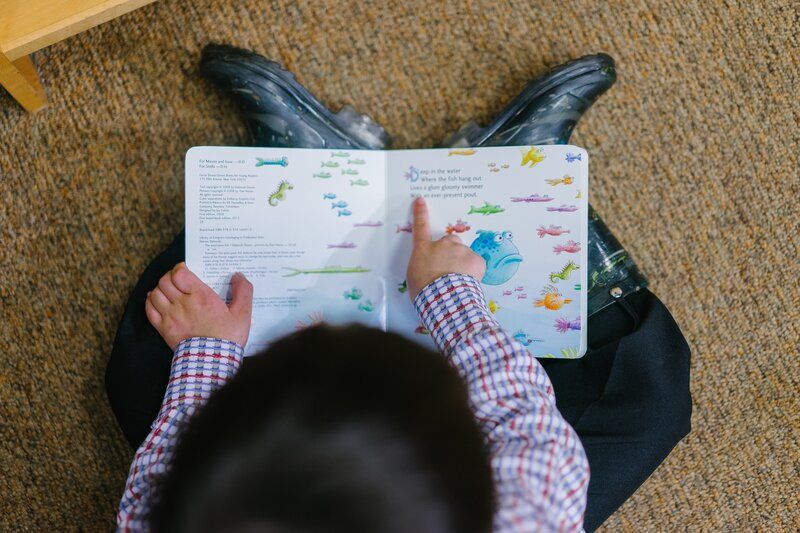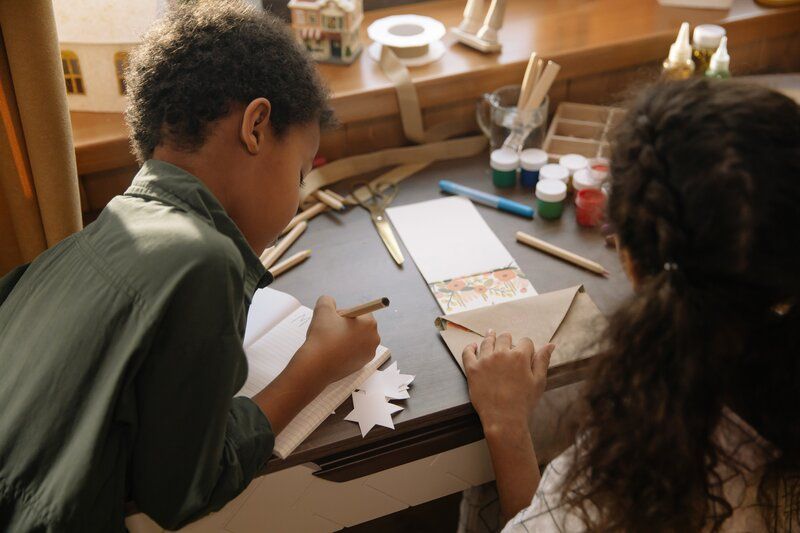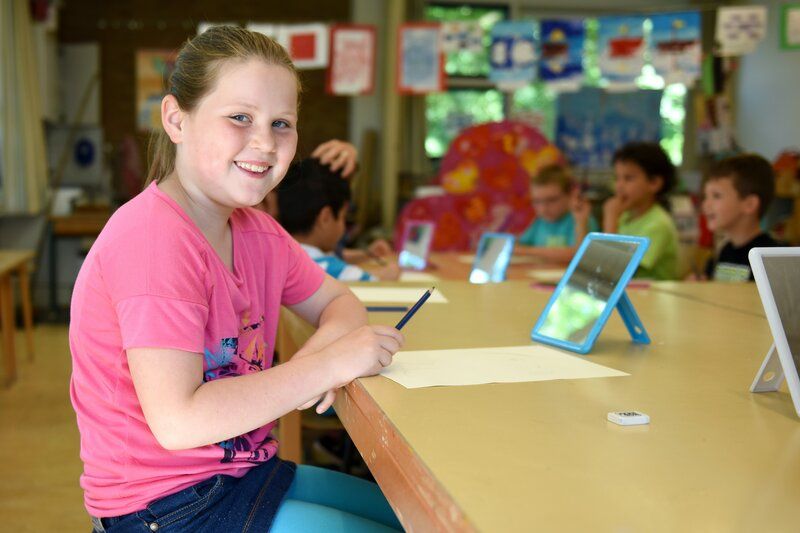4 Ways to Get Kids Excited about Learning English
How do you turn studying English from a chore into a fun way to bond? Here are four engaging ways to get kids pumped about learning--and using--English.

These days, there are so many resources for kids to learn English, it's almost overwhelming! Where to begin? Studying textbooks and grammar worksheets might work for an adult, but it's very boring for children. What will actually make kids excited about learning? How do you turn studying English from a chore to a fun bonding activity?
Fear not! As an ESL teacher myself, I know how important it is to make English fun. Most of these options will work for kids of any age and level. It's just a matter of finding what clicks!
Here are four engaging ways to get kids pumped about learning--and using--English.

1. Start With English Books
Kids make the best bookworms. Books are a classic form of entertainment and they can come in so many different formats. They don't have to be just novels; think graphic novels, comic books, chapter books, or audiobooks, you name it.
This is especially useful because you have reading options. Maybe your kid prefers long fantasy books--or maybe they aren't ready for chapter books yet. That's okay! Here are some options to bring English stories into their lives:
Picture Books
If your child is just starting to learn English, try picture books and read aloud the words together. Go slowly, and use the pictures to guide them along in their comprehension.
You can turn this into a challenge. Have your child point out specific letters ("Do you see a T on this page?") or look for words that begin and end in the same letter (like eagle).
Chapter Books or Graphic Novels
Now, if your child is able to read at a higher level and they're feeling confident, chapter books can get them excited about English like nothing else! I have great memories of curling up after school, lost in a story.
My higher-level students love reading Harry Potter and the Percy Jackson series. But you can think beyond those books, too! Graphic novels like Diary of a Wimpy Kid or comics have pictures as well as text, so even if they're not confident in their English yet, they can still be grabbed by the story.
Audiobooks
Of course, traditional books will develop their reading skills fast. They'll grow familiar with English spellings, grammar and tone all the while immersing themselves in another world.
Maybe your child doesn't like to sit down and read. Or maybe you don't have much time in the day, between racing to afterschool clubs or sports practice. Then how do you get them into thrilling stories of dragons and superheroes?
Audiobooks! These are just as engaging as traditional books, and with the added bonus of helping little ones practice their listening skills--which is just as important!
Consider putting on an audiobook in the car or during bathtime. These have an added bonus of helping children with their pronunciation and accent. Just like with traditional books, you can find stories that suit any level.
Need a recommendation? Try out the The Secret Garden by Frances Hodgson Burnett. This is a story adapted from a beloved children's novel, and sure to get their imagination going.

2. Get Them Hooked With Youtube English
For kids, watching songs, cartoons or personalities on Youtube can reach them like nothing else. Kelsey has written before about some great Youtube videos with which to practice English sounds. The great thing about Youtube is there's content out there for every sort of child! No matter their age, hearing English in song or story-format will help them absorb the language.
What to watch? Consider your child's interests and age level. Do they like gaming or sports? What about cartoons or stories?
If they're still young or just starting their journey with English, I recommend they start with songs. Studies show that listening to music can help child remember words and get a better sense for grammar. The most important first step is mastering the 44 sounds in English!
So, you should try phonics songs that will stick in your head for days. For example, there's the The Vowel Family song by Pinkfong. This song will introduce the 5 vowels of English: a, e, i, o, and u (and sometimes y)!
Together you can practice their listening skills and have fun. Not only that, but rhyming has been proven to build their memory, literacy and social development. Bonding and learning, what gets better than that?
In addition to songs, there's channels like Sam and Mel English for Children or Pororo the Little Penguin.
Now, if your child is older or even a teenager, they might feel too old for a children's cartoon. In that case, consider the the British Council's vlog series. They can watch people go throughout their day or talk about their lives in their native country--a good mix of culture and language education!
After, you can ask them questions to get them thinking about what they heard. Did they understand the story? Was there anything they found funny or silly?

3. Learn English With Recipes
Hands-on learning is usually more fun than a worksheet. One seamless way to incorporate English into your child's everyday life is to use it in daily activities, like cooking.
Who doesn't love baking a tray of cookies with their little one? All right, kitchen messes aside, cooking together is a great way to bond. You can use an English recipe to make their favorite treat. If your child is too young for reading, you can read it aloud or watch a video.
Cooking from a recipe in English is a great way to get them practicing numbers, ingredient names, and verbs (such as "mix", "stir", etc.) As an English teacher living abroad, my favorite activity with my students is craft or cooking days! Even if they're not interested in learning English, they will get interested in snacks.
Another bonus: they can learn about another culture's food, like crepes!

4. Find a Pen Pal to Learn English Together
If your child is struggling to find a reason to learn English, then maybe writing to another kid their age will encourage them. They can become a pen pal--someone who writes letters to another, usually from another country.
Becoming a pen pal is a classic way to build connections between people of different cultures, countries and languages. Once you match with another child, you can exchange letters and talk about your lives.
As Very Well Family puts it:
"Having a pen pal promotes many key skills, including reciprocation (a letter filled with all “me” and no questions does not make for a good pen pal relationship!), empathy and mutual concern. It also fosters the ability to search for and find common bonds, a key element of true friendship."
So it has a lot more benefits than just practicing their reading or writing skills! This could get your child excited about English as well as Social Studies.
Pen pal-ing is traditionally done with snail mail--that is, real letters. Don't be nervous! For tips on how to write a great letter in English, check out our post here. However, there are options to become pen pals over email or text. The choice is yours!
To start, look into programs that will match you with another child, such as My Language Exchange or Students of the World.

Go Forth and Get Excited About English
It's easy to get burnt out on English worksheets or grammar lessons. If your child is feeling demotivated, try one of these four ways to get them excited about using English.
Does your child prefer active games or quiet reading hours? Are they in their first steps of learning the alphabet or are they ready to write letters to a new friend?
First, consider your child's needs and go from there. If they're young, give them immersive content that will have them passively or actively hearing the language. Songs, audiobooks or videos can be a great tool.
If your child is older or higher-level, think about ways for them to put their English knowledge into practice. This is especially vital if they're struggling to find a reason to care about English. With these four solutions, you can show them that English can be fun, relevant and interesting!
Best of luck with your child's English journey. See you next time!
